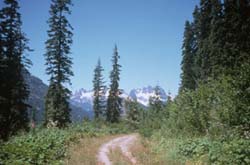The U.S. Fish and Wildlife Service collects fees at more than 100 National Wildlife Refuges. At least 80% of all fees collected at a refuge are reinvested back into that refuge to provide quality recreational facilities and opportunities to our visitors. The remaining 20% is used in that geographic region. Each refuge that collects a fee posts a notice at the collection site informing the public of the use or anticipated use of recreation fees collected during the previous year.
FEDERAL LANDS RECREATION ENHANCEMENT ACT FREQUENTLY ASKED QUESTIONS
What is the Recreation Enhancement Act?
The Recreation Enhancement Act allows the government to charge a fee for recreational use of public lands managed by the Bureau of Land Management (BLM), the Bureau of Reclamation (BOR), the Fish and Wildlife Service (FWS), the National Park Service (NPS) and the Forest Service (USFS). It is important to note that bureaus and agencies will not charge fees for all recreational use of public lands.

The majority of the fees collected will be reinvested back into the collection site to enhance visitor services and reduce the backlog of maintenance needs for recreation facilities such as trail maintenance, toilet facilities, boat ramps, hunting blinds, and interpretive signs and programs. Bureaus and agencies may not use recreation fees to pay for biological monitoring of threatened and endangered species.
The law differentiates among the participating bureaus and agencies. The NPS and FWS units in the National Wildlife Refuge System may charge entrance fees. The other participating bureaus and agencies may charge "standard amenity fees" where specific criteria are met. The FWS and NPS may also charge "expanded amenity fees" for use of a specialized facility, equipment, or service. The other bureaus and agencies may charge "expanded amenity fees" in those areas where additional amenities are provided, such as boat launches, rental cabins, electrical hookups, dump stations, enhanced interpretive services, reservations, transportation, swimming facilities, and picnicking. A special recreation permit fee will also be allowed for specialized recreation uses such as group activities, recreation events and motorized vehicle use.
The Act provides for public input into the development of the recreation fees through the establishment of Recreation Resource Advisory Committees for all lands managed by the National Forest Service and Bureau of Land Management. All participating bureaus and agencies will involve the public in many aspects of the Recreation Fee Program.
How will this affect my usage of lands managed by the U.S. Fish and Wildlife Service?
The only change has been to cancel the entrance fee at Gavin's Point National Fish Hatchery in South Dakota. The Act does not allow hatcheries to collect entrance fees, though hatcheries may charge expanded amenity fees.
What is the America the Beautiful Pass?
The Act instructs Federal Land Management Agencies to develop a pass that covers the entrance fee and standard amenity fee for Federal recreational lands. It replaces the current Golden Eagle, Golden Age, and Golden Access Passports, as well as the National Parks Pass. This pass will let visitors gain entrance to federal lands managed by the five participating bureaus or agencies that are open to recreation opportunities . Existing National Park passes, Golden Eagle, Golden Age, and Golden Access Passports will be grand fathered in under their existing benefits and will remain valid until expired. These passes will continue to be sold until the new pass is available. Site specific and regional passes such as the Adventure Pass for National Forests in Southern California will remain valid and will continue to be available under this Act.
The pass will have a senior and disabled iteration, with similar benefits to the Golden Age and Golden Access Passports. Details of the pass still need to be determined and the pass will not be available until 2007.
I use my Duck Stamp to visit refuges now. Will I still be able to use my Duck Stamp?
You will still be able to use your Duck Stamp to gain entrance to refuges. Thanks to the sale of the Federal Duck Stamp, more than $670 million has been generated to purchase or lease over 5.2 million acres of waterfowl habitat in the United States. Your support of the Duck Stamp program helps refuges provide habitat for thousands of migratory birds, endangered and threatened species, mammals, and amphibians and results in recreational opportunities on many refuges.
Which refuges charge recreation fees now?
List of refuges that collect fees (142 KB PDF)
Will more refuges charge recreation fees now that the Recreation Enhancement Act has been passed?
Yes, we already have some sites and new activities that want to join the Recreation Fee Program. Since the Act also repealed the collection authorities under the Land and Water Conservation Fund Act and those under the Emergency Wetlands Resources Act, some sites that collected recreation fees under those authorities may join the Recreation Fee Program.
Where does the money go from the recreation fees?
At least 80% of all fees collected at a specific location will remain available for expenditures at that location, with the remaining balance used rsegion-wide. In FWS, three regions adopted the 80% - 20% split. The other four regions return 100% of the collections back to the collecting sites. The agencies will post notices at each recreation fee area informing the public of the use or anticipated use of recreation fees collected at that site during the previous year.

